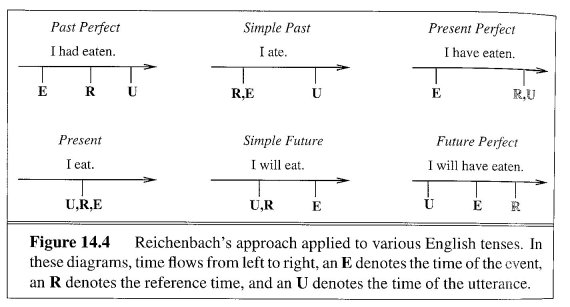5 September 2004
Verb tenses
I've been thinking about verb tenses recently (man, am I boring), how they are formed, and what they mean. I once had them down solid--they're not that difficult--but I always need a refresher when the auxiliaries are used. This entry clarifies tenses and adds some useful insights from my books on natural language processing--although IANALG (I am not a licensed grammarian).
The following table shows the past, present, and future tenses in simple tenses, perfect tenses, and progressive forms (taken from my old Harbrace College Handbook).
| Present | Past | Future | |
| Simple | ask | asked | will ask ("will" + present) |
| Perfect (conjugated "to have" + past participal) | has asked | had asked | will have asked |
| Progressive (conjugated "to be" + present participal) | is asking | was asking | will be asking |
| Progressive Perfect (conjugated "to have" + past participle of "to be" + present participal) | has been asking | had been asking | will have been asking |
Active and passive voice are distinguished by passive's use of "to be" (distinct from the progressive use of "to be").
| Present | Past | Future | |
| Passive (conjugated "to be" + past participle) | is asked | was asked | will be asked |
The wonderful, seminal book Speech and Language Processing quotes Reichenback's description of English tenses. In it, he illustrates the relationship of the event being discussed, the time of the utterance, and the time that is being referenced in the utterance. It is a stunningly logical approach. Here is the chart from the book:

- The city posted by sstrader on 6 March 2016 at 9:43:27 PM
- The children of Infinite Jest posted by sstrader on 23 August 2015 at 3:48:24 PM
- Posthuman dystopia posted by sstrader on 22 March 2015 at 10:21:25 AM
- Poetry and apocalypse posted by sstrader on 22 November 2014 at 10:41:33 AM
- Roman Jakobson's functions of language posted by sstrader on 5 October 2014 at 10:36:23 AM